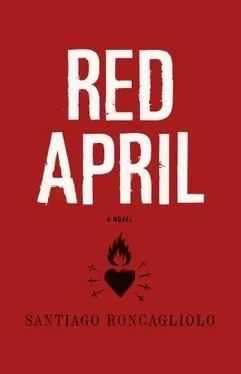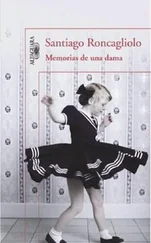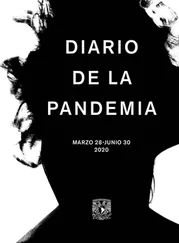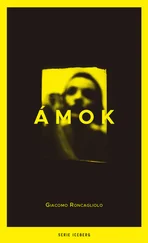Or perhaps he had simply wanted sex. In either case, he felt like a perfect imbecile. It would be very difficult to convince himself otherwise. Above all, it would be very difficult to convince Edith.
He decided to concentrate on his investigation in order not to think about her, although moments he had been beside her returned like flashes to flog his memory. Her closed eyes, squeezed tight like her clenched teeth, her legs trying to resist his attack. He would return to the archives of the Office of the Prosecutor. He wanted to know if Father Quiroz had been threatened or undergone earlier attempts on his life during the years of terrorism. Perhaps that would give him a clue. This time there had been no note from Sendero, but that must have been due to lack of time. Chacaltana had interrupted the killers in the middle of their work, who knows how they had proposed to end it.
For lunch he ate a chicken sandwich at a street stand and then went to the Office of the Prosecutor. The faithful were forming lines at the Church of Santo Domingo, holding pieces of cotton in their hands to clean the wounds on the image of the Lord of the Holy Sepulcher. The prosecutor imagined all those hands, one after another, touching the wounds of Christ. Without knowing why, that made him think of his mother and of Edith.
Again he walked down the deserted corridors of the Office of the Prosecutor on a holiday, until he reached the file room. He began the search. Quiroz did not appear among the papers. Or perhaps he was there in a place beyond the images of Edith glued to the prosecutor's eyes: her body wrapped in the towel silhouetted against the first light of day. Her small feet, two soft packets. The taste of her pubis. The shining path that joined her neck to her navel, a road the prosecutor would never travel again. Perhaps she would accept an apology, he thought, as he opened boxes of abandoned cases. After all, he was not a bad sort. He had behaved well with her … at least until that morning. Perhaps she would be able to forget about it quickly. He would bring her flowers that night. Ask her to dinner. Take her dancing. She would like that. Soon, the morning's disgraceful incident would be only a bad memory, easy to erase.
Without realizing it, in a reflexive way, he was looking for Edith's name in the files. He tried to recover from his not very professional deviation from his subject. Then, out of curiosity, he looked for it deliberately. Her parents, at least, had to be there somewhere. He wanted to know more about her. He felt like looking for her everywhere, learning how he could make a good impression on her, finding her at every moment of her life. He was afraid he would not see her again in person, that she would not want to see him. But at least there, among the accusations, the victims, the perpetrators on both sides, Edith Ayala, at least a little of her, would be present.
He spent the afternoon looking through the old papers and enduring the allergic reaction produced by the dust. Edith's parents, Ronaldo Ayala and Clara Mungía, did not appear among the abandoned accusations. He continued looking until he found them in the reports of battle casualties. The attack they had led on the police post had been a desperate maneuver. Six poorly armed terrorists against a station with ten police. They had attacked at dawn on a day in July in the mid-eighties. Apparently, they miscalculated the number of men waiting for them. The police had been warned of the attack. The assault was a massacre. One policeman died, two were wounded, and all the terrorists were annihilated. The legal reports indicated shots in the back of Ronaldo Ayala's neck. They had finished him off after the assault. His wife showed wounds in the stomach and a final shot in the chest. When she was already wounded, she had continued to advance. In the photograph she looked a little like Edith: the hair, the neck the prosecutor remembered so well, were a maternal inheritance. But Clara Mungía did not have her daughter's sweetness. The identification-size photograph, taken in a previous arrest, showed the inexpressive, resolute gaze the prosecutor had seen so often beneath the eyebrows of Senderistas.
The file included an attachment that spoke of Edith. In the mid-nineties, a repentant Senderista had accused her of being a member of the logistical apparatus of the party. She was not yet sixteen, but according to the witness she passed weaponry and messages among the cells that survived in Ceja de Selva. She had been interrogated, but nothing of interest had been learned. She showed no lesions when she left the interrogations. After that, she had been left in peace. A report from Intelligence added that for two years she had dedicated herself to bringing medicine and food to those imprisoned for terrorism at the maximum security prison in Ayacucho, while she worked as an assistant in a butcher shop in the central market.
Butcher shop. Prison. Inevitably, he thought of Hernán Durango, Comrade Alonso, and his tale of the Indian servant's dream, and his stories. He remembered the first time he had seen him. The party has a thousand eyes and a thousand ears, he had said. The eyes of the people. Or perhaps only two eyes like two nuts in their shells, above two clenched jaws sweating with rage, two eyes vacant in their sockets. Almost in spite of himself, the prosecutor made some deductions and came to a conclusion. Perhaps he had the killer. At that moment, his blood turned to ice in his veins.
He thought it was an unfounded suspicion and returned to his office. He wanted to reject it. He wanted to remove that possibility. He telephoned Colonel Olazábal:
“Good afternoon, Colonel. How are you?”
“Well, I'm fucked, Chacaltana. Just like you, I suppose, working on a holiday.”
“I spoke about your promotion to Commander Carrión,” the prosecutor lied. “He seemed very well disposed, but he has been retired.”
“Yes. Well, news flies.”
“We will have to begin that task again with his successor. Do not be concerned, I will help you.”
“Thank you very much, Señor Prosecutor. You know that if there's anything I can do for you …”
“Well, to tell you the truth, yes, now that you mention it. I need a list of visitors to Hernán Durango González.”
“Right now?”
“If that might be possible, yes, Colonel.”
The colonel promised to call him back in five minutes. The prosecutor sat waiting by the phone. It had to be a coincidence, a miscalculation, a dead end. This whole story was filled with them. He spent an hour and a half next to the phone, caressing his pistol, until the colonel called.
“Let me see … Here it is: to begin with, the inmate's parents: Román Durango and Brígida González …”
“Ah ha …”
“A sister named Agripina …”
“Yes …”
“And just one other person. Not a relative. Maybe a girlfriend, though in that case, she was very patient, don't you think? Though you know, there are girlfriends who wait twenty years, let me tell you …”
He gave a short speech on girlfriends and inmates until he said a woman's name, and then the prosecutor moved his lips and felt a huge pain in his chest. Without saying good-bye he hung up the phone and hurried out of the building.
Outside, night had just fallen. The Lord of the Holy Sepulcher, lying in a transparent case on a bed of white roses, had taken over the streets. Blood dripped from his forehead, his side, his hands and feet. Only the candles of the town's notable and wealthy citizens who surrounded him illuminated his figure in the darkness. The faithful were dressed in black. Streetlights had been turned off. At that moment, the silence was absolute.
Chacaltana pushed his way through the solemn crowd, advancing directly to the restaurant on the square. Some people pushed him back, but no one dared to break the silence of the Sepulcher. Even among the tourists inside El Huamanguino restaurant, the atmosphere was one of reserve and silence. Edith was at her counter when he came in. She looked at him with an expression of surprise that quickly turned into fear and then hatred. She stepped back reflexively but did not move from the counter. It was he who approached her and took her by the arm.
Читать дальше












